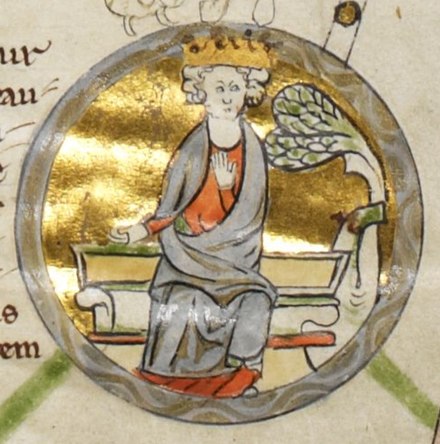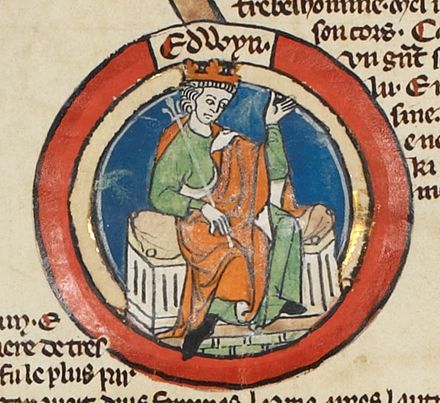 Edmund I (920/921 - 946)
Edmund I (920/921 - 946)
Aethelstan had died without issue, and so the crown passed to his brother, Edmund. He now had to deal with the resurgent threat of the Vikings, this time as a force from within his own country, but despite battles and truces, he had to surrender the part of Danelaw that had been taken back, the five boroughs of Lincoln, Derby, Stamford, Nottingham and Leicester. He was quick to regain them a year later though, when Olaf died in 941. His successor, Anlaf Sihtricsson, accepted baptism and so, having acknowledged the authority of Edmund, it wasn’t long before he was expelled from York and the king took back the city. Nevertheless, the Northumbrians continued to resist his rule and that of his successor Eadred, until finally submitting in 954.
Edmund passed more laws, some of them dealing with the celibacy of clerics. You wouldn’t want to risk a quick wriggle with a servant girl or lady-in-waiting in Edmund’s time! Just not worth it mate. Your remains would be denied burial in consecrated ground (and really, if you’re going to go into the clergy business that’s the very ground you’ve staked out for your mouldering bones, surely, while your soul ascends to Heaven maybe), and more immediately and importantly, your lands could be snaffled by the king for being a bad boy. Nah, just take cold showers and think about gardening, son, much more profitable, both for your immortal soul and your property portfolio, whichever you value the more.
Murderers were not allowed come into the presence of the king. Now here I’m confused. If you were a murderer, then surely you would be executed or at worst in jail, and given this was the tenth century I don’t think too many killer were cooling their heels in cells! So, is this not a pointless law? Also, how do you identify a murderer? The law said apparently that he had to have done penance for his crime, though it doesn’t state exactly what that penance was. I’m willing bet it wasn’t three Hail Marys and an Our Father, though. It also uses odd language: “not allowed to come into the neighbourhood of the king”. What does that mean? The city he rules over? But as King of England (or at least, all the Anglo-Saxons) he ruled over every city, didn’t he? Or maybe it meant where he was sitting at any one time, where his court - which in those days was quite mobile and moved from town to town something like a travelling mummers’ show - was set up? Vague, to say the least. And what if he lived in that town, village, city, and then the king arrived? Had he to leg it until His Majesty had buggered off somewhere else?
Edmund also condemned false witness and the use of magical drugs (I guess standard drugs were okay then), and was greatly distressed by violence (for a man who put down Viking rebellions, this sounds a little hollow, but I guess he meant non-Crown-sanctioned violence, yes?) in particular wishing to put an end to blood feuds and vendettas. He proclaimed that any relatives of someone murdered could not go after the murderer, but that he, the murderer, would have to pay weregild to the relatives of the victims. Weregild we discussed earlier, but basically it was a price levied by the Saxons on people as their worth, also called a man price (I guess women weren’t worth anything), so essentially compensation had to be paid. If the murderer told the relatives where they could stick their compensation, they were allowed to practice their vendetta, but mind they keep away from churches and royal manor houses. All this blood feud business seems to have been imported by those pesky Vikings, and Edmund was eager to stamp out as much of their influence as he could.
He wasn’t too easy on slaves either. I suppose, as usual, we have to remember this is all taking place more than a thousand years ago, when slavery was not only permitted but seen as a natural part of the fabric of society, a holdover from when the Saxons were warriors and raiders in Germany I guess. Even so, it is pretty nasty and seems quite unfair
. "we have declared with regard to slaves that, if a number of them commit theft, their leader shall be captured and slain, or hanged, and each of the others shall be scourged three times and have his scalp removed and his little finger mutilated as a token of his guilt".
But that was life in tenth-century Anglo-Saxon England, as the country slowly metamorphosed from a motley collection of villages, to seven separate kingdoms and finally, eventually, into one cohesive nation.
Edmund is the only king I’ve read of so far (at least, the only English king) who died in a brawl. How this could have happened I’m unsure, but maybe back then kings did not have the kind of protection that they did later; you can’t, for instance, imagine Henry VI or Edward III going essentially into a pub to rescue a servant and getting killed. I could maybe seen Henry V or Richard I, but even so, it seems a shocking lapse in royal security to allow such a thing to happen. According to John of Worcester:
“While the glorious Edmund, king of the English, was at the royal township called Pucklechurch in English, in seeking to rescue his steward from Leofa, a most wicked thief, lest he be killed, was himself killed by the same man on the feast of St Augustine, teacher of the English, on Tuesday, 26 May, in the fourth indiction, having completed five years and seven months of his reign. He was borne to Glastonbury, and buried by the abbot, St Dunstan.”
There have been other, perhaps more plausible theories that this was an actual assassination, but even if so (and it’s certainly not proven, nor ever will be, and most historians shrug and say no) again I can’t remember any king up to now being actually assassinated. Killed in battle, yes, but taken out? At any rate, he was succeeded on his death by his brother, Eadred, making this the third son of Edward the Elder to sit on the English - or at least, Saxon - throne.
Eadred (923 - 955)
Eadred faced two new Viking threats - well, one old and one new. First the deposed Olaf Sihtircsson, booted out of Dublin, returned to take York and was for a time tolerated by Eadred, but later defeated and supplanted by the brilliantly-named-for-a-Viking Eric Bloodaxe. He in fact set himself up as king of Northumbria, which for Eadred was a bridge too fu
cking far, sunshine, and so he marched against him. He kicked the s
hit out of him and was on his way home in triumph when he was jumped by Eric’s allies, but he warned them he’d be back, bigger and a hell of a lot more angry if they didn’t f
uck off back to Northumbria, and so they did, realising their king had been knocked for six and that their best bet was to play nice with the English king.
 Eadwig (940 - 959)
Eadwig (940 - 959)
Eadred died at the ripe old age of thirty-two, having reigned for ten years but sired no children. He was therefore succeeded by Edmund’s son, Earwig, sorry Eadwig. Ah, not though for King Eadred the glory of dying in battle, or even the slightly lesser glory of having your guts ripped out by a thief’s knife down your local, or even like Edwin, way back, drowning as your ship went down. No, his was a death that seemed somewhat common to the men of his age, and no surprise, given how and what they ate. It is recorded as a “disease of the stomach” which forced him to “suck the juices from his food, chewed on what was left and spat it out.” Well, you certainly wouldn’t have wanted to be invited to dine at the royal table, now would you?
Eadwig sat the throne for less than half the period his uncle had reigned, a mere four years, and his rule did not get off to the perfect start. Fresh from his coronation, he felt he wanted some copulation, and went off from his banquet, probably leaning nonchalantly against the wall and saying to likely maids, “I’ve just become king, you know,” or possibly “Fancy some Wes-sex with the new king darlin’?” Or possibly not. He was caught with not one, but two ladies - a mother and daughter - by the terribly religious and utterly spoilsport Saint Dunstan, who, king or no king, apparently grabbed him and dragged him back to the banquet, with possible boxing of the ears and grunts of “Here you, you’re only king a few hours and already you’re trying to father bastards!” The king was, of course, very penitent and understanding, forgiving the abbot entirely, and the loss of Dunstan’s abbey and his own sudden urgent need to flee the country was surely all down to a clerical error. Well, certainly an error for
that cleric! In the event, Eadwig married one of the women. Guess which? Well, which would you choose, if it was between a mother and her daughter? Oh, you liar!
There’s a belief that the whole account could be bollocks, made up by the miffed Dunstan, but then we do have the word of our buddy John of Worcester, who so faithfully chronicled the killing of Eadred in that pub brawl, so, you know, maybe. It’s all over a millennium ago, and we all know how historians like to bicker and argue over just about everything. But given Eadwig was only sixteen at the time and had just become the most powerful man in the country, well, I think I can understand where he was coming from. Dunstan had his revenge from exile though, as he made sure the marriage got annulled, citing the ancient ruling of “seven degrees of consanguinity” which basically means I think that you couldn’t marry anyone who had any sort of relationship to you, and there was a connection there. Weak, but enough for Dunstan to run blabbing to the Pope, who no doubt shook his head and tutted at the kids these days.
Not satisfied with breaking up the lovebirds and ensuring any children they had would now be illegitimate, our Dunstan started supporting Eadwig’s brother and rival, Edgar, who himself found allies in the eternally-disgruntled Northumbrians and Mercians, and with civil war looming the two decided to split the kingdom, Edgar becoming (sorry) king in the north while Eadwig ruled Wessex and Kent. Not for long though. Two years later he was brown bread, and Edgar took the lot, becoming the next King of England.